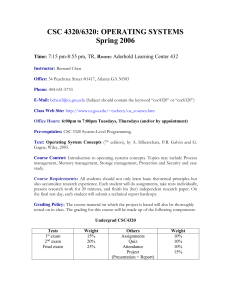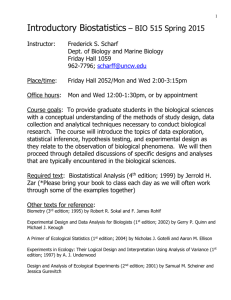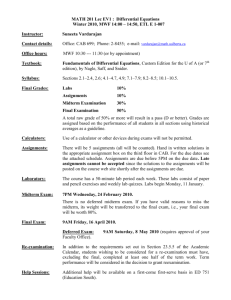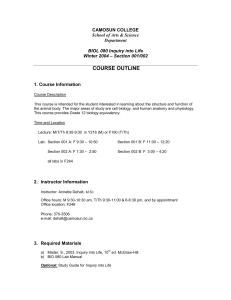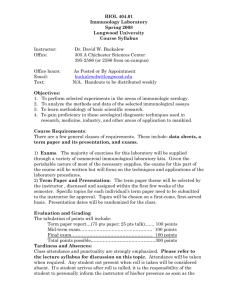Corpus Christi College Course Outline Semester: Winter Term 2013
advertisement
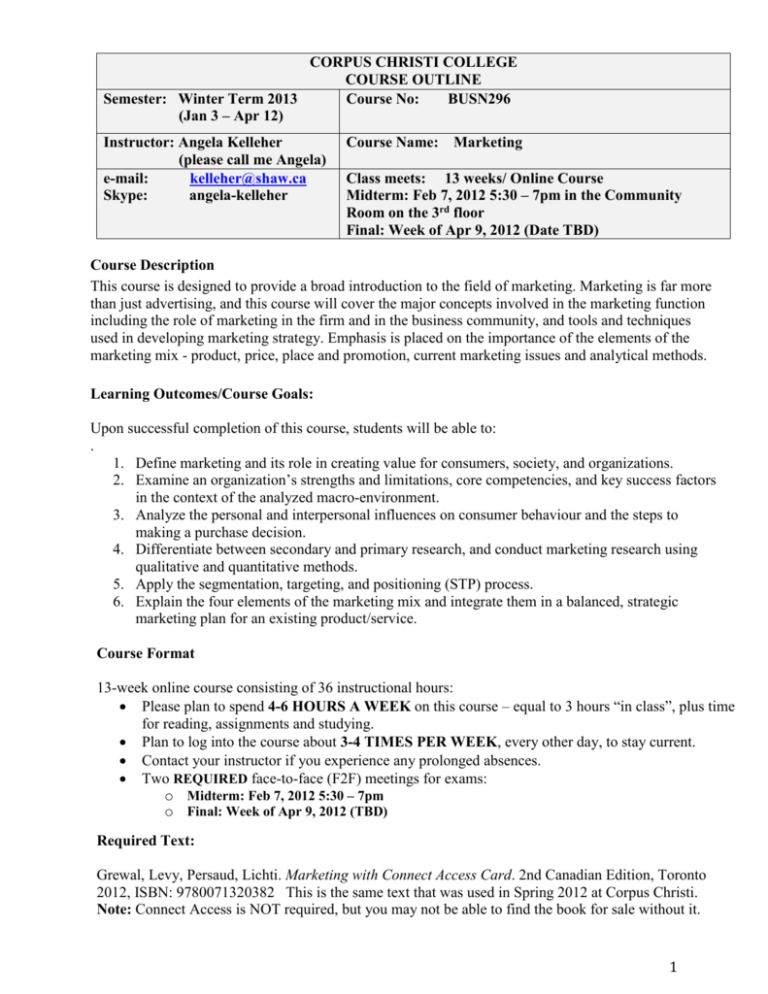
CORPUS CHRISTI COLLEGE COURSE OUTLINE Semester: Winter Term 2013 Course No: BUSN296 (Jan 3 – Apr 12) Instructor: Angela Kelleher (please call me Angela) e-mail: kelleher@shaw.ca Skype: angela-kelleher Course Name: Marketing Class meets: 13 weeks/ Online Course Midterm: Feb 7, 2012 5:30 – 7pm in the Community Room on the 3rd floor Final: Week of Apr 9, 2012 (Date TBD) Course Description This course is designed to provide a broad introduction to the field of marketing. Marketing is far more than just advertising, and this course will cover the major concepts involved in the marketing function including the role of marketing in the firm and in the business community, and tools and techniques used in developing marketing strategy. Emphasis is placed on the importance of the elements of the marketing mix - product, price, place and promotion, current marketing issues and analytical methods. Learning Outcomes/Course Goals: Upon successful completion of this course, students will be able to: . 1. Define marketing and its role in creating value for consumers, society, and organizations. 2. Examine an organization’s strengths and limitations, core competencies, and key success factors in the context of the analyzed macro-environment. 3. Analyze the personal and interpersonal influences on consumer behaviour and the steps to making a purchase decision. 4. Differentiate between secondary and primary research, and conduct marketing research using qualitative and quantitative methods. 5. Apply the segmentation, targeting, and positioning (STP) process. 6. Explain the four elements of the marketing mix and integrate them in a balanced, strategic marketing plan for an existing product/service. Course Format 13-week online course consisting of 36 instructional hours: Please plan to spend 4-6 HOURS A WEEK on this course – equal to 3 hours “in class”, plus time for reading, assignments and studying. Plan to log into the course about 3-4 TIMES PER WEEK, every other day, to stay current. Contact your instructor if you experience any prolonged absences. Two REQUIRED face-to-face (F2F) meetings for exams: o Midterm: Feb 7, 2012 5:30 – 7pm o Final: Week of Apr 9, 2012 (TBD) Required Text: Grewal, Levy, Persaud, Lichti. Marketing with Connect Access Card. 2nd Canadian Edition, Toronto 2012, ISBN: 9780071320382 This is the same text that was used in Spring 2012 at Corpus Christi. Note: Connect Access is NOT required, but you may not be able to find the book for sale without it. 1 Assessments Midterm Final Discussion postings Assignments Total 15% 35% 20% 30% 100% 50 M/C questions 100 M/C questions 19 postings + start-up activities 3 x 10% Exams: Midterm exam – 15%, Final exam – 35% Both are MULTIPLE CHOICE, in-person exams. The midterm exam will consist of approximately 50 multiple choice questions focused on chapters from first half of course (see schedule), with approximately equal weighting for the chapters. The questions will have an emphasis on application over simple recall. You definitely want to understand the terms, but focus on understanding and applying rather than memorizing definitions. The final exam will consist of approximately 100 multiple choice questions and will cover all 17 chapters, with an emphasis on application questions. YOU MUST PASS A WEIGHTED AVERAGE OF THE TWO EXAMS TO PASS THE COURSE. Assignments: 30% Complete three assignments, due the Friday of Week 3 (25 Jan), Week 8 (1 Mar) and Week 12 (29 Mar). Each of the assignments will be based on a case study, with more information on the case study requirements to be provided in Moodle. Late assignments will be accepted, but will incur a penalty of 20% per day or part of day late. ALL ASSIGNMENTS ARE TO BE COMPLETED INDIVIDUALLY. YOU MUST COMPLETE ALL THREE ASSIGNMENTS OR YOU MAY NOT WRITE THE FINAL EXAM. Participation: 20% - Discussion postings There will be 17 forums (one per chapter) in the course. You are expected to participate in all 17 and make one original posting per forum. Some forums will have multiple questions, and the maximum number of responses will be indicated for each question. So, if you are first student to arrive in the forum, you can answer any of the questions. If you arrive late in the forum, and a question already has the maximum number of answers, you must answer a different question. The deadline for discussion postings are MIDNIGHT ON FRIDAY of each week after which the forum closes for that chapter. For example, Week 3 covers two chapters and therefore has two discussions. You may begin posting as early as you want, but you must make one original posting for Ch. 4 and a second for Ch. 9 by midnight Fri, January 25. Each discussion posting will be graded out of 1 mark, and 1 mark will be DEDUCTED for any forum that is missed, for a max total of 17 marks. IF YOU DO NOT PARTICIPATE IN A CHAPTER DISCUSSION, YOU ARE CONSIDERED ABSENT. IF YOU ARE ABSENT FOR MORE THAN FOUR CHAPTERS IN THE COURSE, YOU MAY NOT WRITE THE FINAL EXAM. Late postings will be read, but will receive a zero and are considered an absence. Absences are reported based on the 17 chapter discussions. The purpose of the discussion postings is to work the course material as a class. Read each other’s posts every week as well as the responses from the instructor to get a well-rounded idea of how to apply the course concepts - this is one of the best ways to study the material. Your posting should be 100-200 words and should provide a complete, HIGH QUALITY response to the question, applying the relevant concepts and terminology from the textbook. Less than 100 words is not enough and won’t get a good mark. You will receive detailed feedback on your first few postings so that you gain confidence about what a high quality post worth full marks looks like. Although all of the work in this course is assessed individually, I strongly encourage you to create informal study groups to talk through the content and help each other prepare for exams. 2 BUSN 296 Introduction to Marketing – class schedule Week 1 3-13 Jan 2 14-20 Jan 3 21 - 27 Jan 4 28 Jan – 3 Feb Ch 3 4 Topic Review course outline and learning activities, assignments and expectations Overview of Marketing Developing a Marketing Plan and Marketing Strategies Analyzing the Marketing Environment Marketing Research and Information Systems 5 6 Consumer Behaviour Business-to-Business Marketing 1 2 Midterm exam – no new material Activities Start-up activities & opening discussion Ch 1 Discussion Ch 2 Discussion 18 Jan – add/drop deadline Ch 3 Discussion Ch 4 Discussion 25 Jan – A1 due (10%) Ch 5 Discussion Ch 6 Discussion Reading week – no new material 7 Feb, 5:30 – 7pm: Midterm exam on Ch 1 - 6 (15%) 15 Feb – Fair warning deadline 7 8 Segmentation, Targeting, and Positioning Developing New Products Ch 7 Discussion Ch 8 Discussion 8 25 Feb – 3 Mar 9 10 Product, Branding and Packaging Decisions Services: The Intangible Product 9 4-10 Mar 10 11 – 17 Mar 11 18 – 24 Mar 12 25 – 31 Mar 11 5 4-10 Feb 6 11 – 17 Feb 7 18 – 24 Feb 13 1 – 7 Apr 14 9-12 Apr 12 13 14 15 16 17 Ch 9 Discussion Ch 10 Discussion 1 Mar – A2 due (10%) Pricing Concepts & Strategies: Establishing Value Ch 11 Discussion 4 Mar – Withdrawal deadline Marketing Channels: Distribution Strategy Ch 12 Discussion Retailing Ch 13 Discussion Integrated Marketing Communications Ch 14 Discussion Advertising, Sales Promotion and Personal Selling Ch 15 Discussion Global Marketing Ch 16 Discussion Ethics and Socially Responsible Marketing Ch 17 Discussion (available via moodle as a pdf) 29 Mar – A3 due (10%) No new material Personal Reflection Discussion Final exam week Week of 9 Apr (TBD) – Final exam on all chapters (35%) *Note: The discussions (1 - 17), the start-up activities, the opening discussion and the personal reflection discussion in the last week are worth 1% each, for a total participation mark of 20%. **Note: This schedule is subject to change by your instructor – please keep apprised of updates via Moodle announcements. 3 Class Policies Missed Tests and In-Class Assignments: If a student misses a test or an assignment because of unexpected illness, he or she must provide the instructor a note signed by a physician stating the date and time of the visit to the doctor’s office. The penalty for late assignments will be a loss of 2 marks out of 10 (20%) per day or part of day late. No makeups will be given for missing participation in discussion forums – they move on too quickly. STUDENTS MUST COMPLETE ALL THREE ASSIGNMENTS OR YOU MAY NOT WRITE THE FINAL EXAM. Adding and Dropping Courses: There is an official form and procedure for use when students wish to drop or add a course. The first step in the procedure is to notify the instructor of the course and to discuss the proposed change with him/her. Attendance: Students are expected to “attend” all classes. In the online environment this means reading all the content and participating actively in the discussions. IF YOU ARE ABSENT OR LATE FOR MORE THAN FOUR CHAPTERS, YOU WILL NOT BE ABLE TO WRITE THE FINAL EXAM. Students should advise their instructors of anticipated absence from the course or absence due to illness. Plagiarism or Cheating: Plagiarism is the use of the language, ideas, or thoughts of another without acknowledgement. It is a serious offence which, like other forms of cheating, incurs severe penalties. At the very least, the penalty for plagiarism will be a mark of zero for the assignment. It may even result in a failed grade or expulsion from the College. Students are advised to familiarize themselves with the rules of practice and conduct concerning the writing of papers and examinations, in order to avoid such dishonesty. More information on this and other policies is available at http://corpuschristi.ca/policies Academic Accommodation for Students with Special Needs: Corpus Christi College seeks wherever possible to welcome students with special needs as participating members of the College community and to provide these students with academic accommodation and opportunities. The College strives to implement accommodations made by the University of British Columbia Disability Resource Centre, which requires documented medical assessment of student disabilities or special needs. Ensuring fair treatment of all students according to their needs and in a manner consistent with academic principles is the responsibility of faculty and administration. Please contact your instructor if you need help. 4
